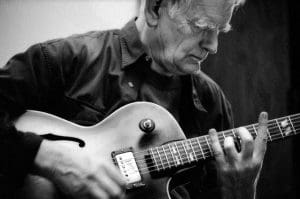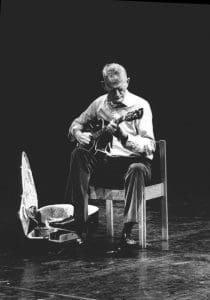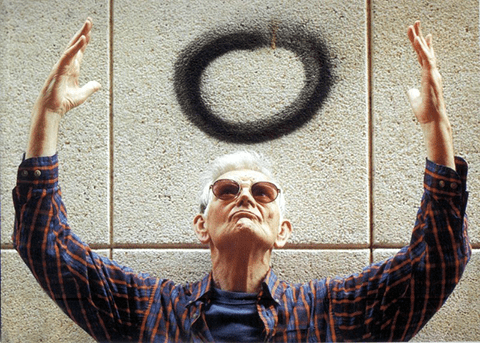Looking for Greater Possibilities: Derek Bailey’s “Ping”
This weekend the Ars Nova Workshop presents hcmf//anw, a British Contemporary Music Festival, featuring the US premieres of compositions from free improvisation luminaries Derek Bailey and Paul Rutherford, as well as a performance from renowned contemporary improviser John Butcher. The series of performances are presented in conjunction with the Huddersfield Contemporary Music Festival, the UK’s largest international festival of new and experimental music, and will bring together key members of the British improvisation scene with some of Philadelphia’s most accomplished and versatile musicians to realize these remarkable works. The festival kicks off on Friday June 24th here at FringeArts with an evening of Bailey and Rutherford’s compositions, including a piece by Bailey based on Samuel Beckett’s short story Ping, and continues through Saturday with two events at the Philadelphia Art Alliance, one of which is free. Click here for tickets (Fri. and Sat.) and more info about the festival.
Samuel Beckett’s short story Ping is a challenging one. In fact, some may even contest its distinction as a story. Considering its lack of any discernible storytelling elements readers are trained to look for, defending its categorization is an uphill battle. Still, it’s hard to deny the presence of a deft craft that propels the reader through this dense, surreal, yet impossibly transformative work of art.
 Though there are various speculations regarding the subject matter of Ping, to dive in with the hope of discerning what it’s “about” can prove maddening. There’s a room, there’s a body, there’s largely an absence of color, there’s a memory . . . maybe. Without clear contextual markers we are left with nothing but a series of impressionistic images, yet they are pointedly wielded. Beckett attempts to represent consciousness as it is experienced by subtracting any sense of omniscience. He relies on an incredibly limited vocabulary and in turn a great deal of rhetorical repetition to achieve this goal. As such, each slight tweak to a particular image or phrase becomes all the more significant. This cycle of repetition and rework has a cumulative effect and by the end there’s a strong sense of finality and change, even if the particulars of that change remain obscured. Though Ping is challenging, heady material to draw inspiration from, it makes some sense that free improvisation pioneer Derek Bailey decided to compose a piece of music around it at the time that he did.
Though there are various speculations regarding the subject matter of Ping, to dive in with the hope of discerning what it’s “about” can prove maddening. There’s a room, there’s a body, there’s largely an absence of color, there’s a memory . . . maybe. Without clear contextual markers we are left with nothing but a series of impressionistic images, yet they are pointedly wielded. Beckett attempts to represent consciousness as it is experienced by subtracting any sense of omniscience. He relies on an incredibly limited vocabulary and in turn a great deal of rhetorical repetition to achieve this goal. As such, each slight tweak to a particular image or phrase becomes all the more significant. This cycle of repetition and rework has a cumulative effect and by the end there’s a strong sense of finality and change, even if the particulars of that change remain obscured. Though Ping is challenging, heady material to draw inspiration from, it makes some sense that free improvisation pioneer Derek Bailey decided to compose a piece of music around it at the time that he did.
During the late 1960s Bailey was exploring methods of diverging from accepted musical idioms in the hopes of forging unprecedented and previously unheard forms. He made strides towards this in the Joseph Holbrooke Trio—with legendary cohorts Gavin Bryars and Tony Oxley—finding confidence in employing free improvisation as a means of breaking the mold, but had yet to fervently commit himself to the practice as he would in proceeding years. “My main preoccupation during this time was in trying to work out—and this was mainly through solo practising/playing [sic] and writing pieces—a way to work within the free situation which didn’t simply mean playing as before but dumping all harmonic and rhythmic restrictions,” he states in his biography Derek Bailey and the Story of Free Improvisation, adding, “In those areas I was looking for greater possibilities, not fewer.” And so, when Ping was published in English in 1967, it must have stood out to Bailey as fertile material to grapple with. Here was a short story that bore little resemblance to any that had come before it. Not only did it break from the established form, but it also attempted to represent impulse and instinct without analysis, a state of mind central to free music.
 Though the piece was never fully realized by Bailey himself, a performance-ready version was dutifully constructed using instrumental scores, both complete and incomplete, as well as numerous pages of accompanying notes found in Bailey’s archives. On Friday night this composition will receive its US premiere along with Bailey’s version of Karlheinz Stockhausen’s Plus-Minus and Paul Rutherford’s Quasi-Mode III.
Though the piece was never fully realized by Bailey himself, a performance-ready version was dutifully constructed using instrumental scores, both complete and incomplete, as well as numerous pages of accompanying notes found in Bailey’s archives. On Friday night this composition will receive its US premiere along with Bailey’s version of Karlheinz Stockhausen’s Plus-Minus and Paul Rutherford’s Quasi-Mode III.
If reading Ping is an initially dizzying experience, witnessing this performance will likely prove a remarkably illuminating one. As Ping is read in full, instrumental interjections are woven around it, rendering subtle shifts in the text all the more palpable. The music works so well to embolden the ebbs and flows of emotion working deep below the surface of the story that it may spur you to revisit the text again and again. It will also most certainly make you pine for more of Bailey’s extremely rare but exceptional compositions.
—Hugh Wilikofsky


